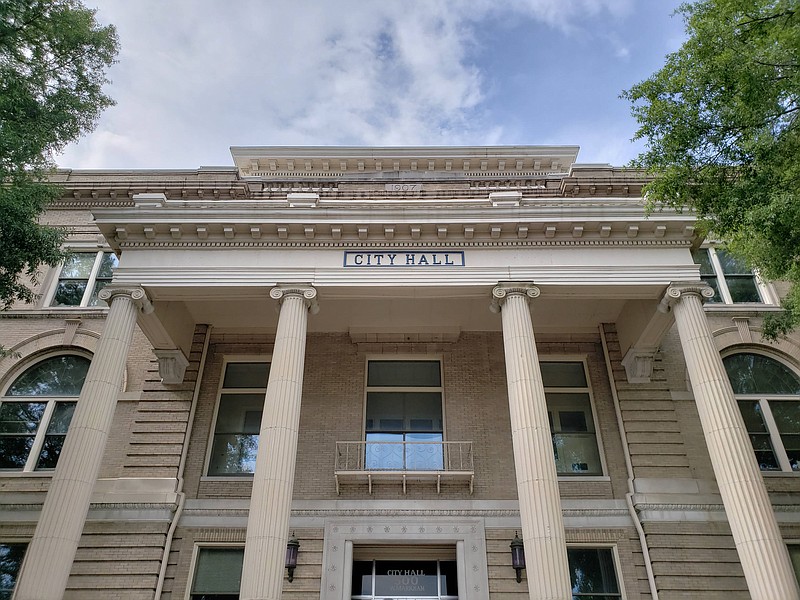A Little Rock neighborhood coalition has asked Mayor Frank Scott Jr. and members of the city board to delay a final vote scheduled for today on Scott's proposal for a 1 percentage-point sales-tax increase.
City directors will have the opportunity at today's Board of Directors meeting to decide whether to call a July 13 special election on the "Rebuild the Rock" package, per the mayor's request.
At a meeting last Tuesday, Scott announced that he would delay the final vote for a week after hearing feedback from city directors. He also announced a series of tweaks to the proposal.
In a statement to the officials dated Saturday and sent Sunday evening, Kathy Wells, president of the Coalition of Little Rock Neighborhoods, asked for more details on the planned spending before an election is called.
Members of the group met by teleconference Saturday to discuss the plan.
In the letter, Wells questioned the binding authority of the measures that city directors are scheduled to vote on today with regard to particular spending categories.
"We noted the election ordinance lacks any specific categories; the ordinance provides for a vote on [the] one-cent permanent sales tax, period. Previous elections specified spending categories on the ballot itself, which we view as good government," Wells wrote. "A resolution of intent to spend some money a certain way is non-binding. To increase revenues 42 percent a year, from now on, calls for legally-binding categories for spending."
As another reason for delay, Wells pointed out the forthcoming aid from the federal government that the city expects to receive in two tranches.
A mayoral spokeswoman in March said the city expects to receive a sum of approximately $37 million as a result of the American Rescue Plan Act signed into law by President Joe Biden earlier this year.
At a meeting last month, Scott said the first half of the funding was expected to be received by May 10, which was Monday, and the second half by the end of next year.
"What are the guidelines for spending this one-time money?" Wells asked in the letter. "Could this money be applied to some items on the list of capital projects to be funded by an increased sales tax? If this was done, what would you change in the proposed spending? It would be good to delay any election until this aid is distributed."
She raised additional questions related to the need for more funding for infrastructure and transit.
Wells also pointed out that some residents may be struggling to pay utility bills that accumulated over the past year of the covid-19 pandemic, when many utilities suspended shutoffs, on top of current bills.
Wells ended the letter with the question, "Why not delay a year on any sales-tax increase election?" The letter appended a series of additional questions from group members.
Scott will need at least five of the 10 city directors to vote in favor of the package in order to use his power to break a deadlock and send the proposal to the ballot.
City directors will consider proposed ordinances for calling the election and levying the sales-tax increase. They also will vote on a resolution establishing general spending categories for the new revenue from the tax.
At-large City Director Dean Kumpuris, when asked how he planned to vote, told the Arkansas Democrat-Gazette on Monday morning that he was still considering the proposal.
Other city directors, including Capi Peck of Ward 4, Kathy Webb of Ward 3 and Doris Wright of Ward 6, could not be reached for comment.
Indications of support for the latest proposal, or the earlier iteration, have come from at-large City Director Antwan Phillips, City Director Ken Richardson of Ward 2 and City Director Erma Hendrix of Ward 1. Indications of opposition have come from Vice Mayor Lance Hines and at-large City Director Joan Adcock.
As a result, the city directors likely to decide the fate of the tax are Peck, Kumpuris, Webb and Wright along with City Director B.J. Wyrick of Ward 7.
At the board meeting last week, Scott released a revised outline of the planned spending under the package. Compared with the original proposal, the new version shifted funding to categories of community-oriented policing as well as infrastructure and reduced the funding allocated for the Little Rock Zoo and early-childhood education.
Scott's proposal would lift the city's local tax rate by a total of five-eighths of a percentage point (0.625) in light of an expiring local tax of three-eighths of a percentage point (0.375). The three-eighths percent tax, approved in 2011, will sunset in December.
If the new tax were approved, then consumers would pay an overall local rate of 9.625% beginning in January when accounting for state and county taxes. The increase would be permanent.
City staffers have said the tax would generate $53 million annually.
According to the "Rebuild the Rock" proposal, capital projects would be completed during the tax's first 10 years.
A resolution establishing subsequent initiatives using the tax revenue would have to be adopted by the city board before the end of the first decade. Oversight would be provided by a citizen-led committee that would hear quarterly project updates and give semiannual reports to city board, according to the proposal.
